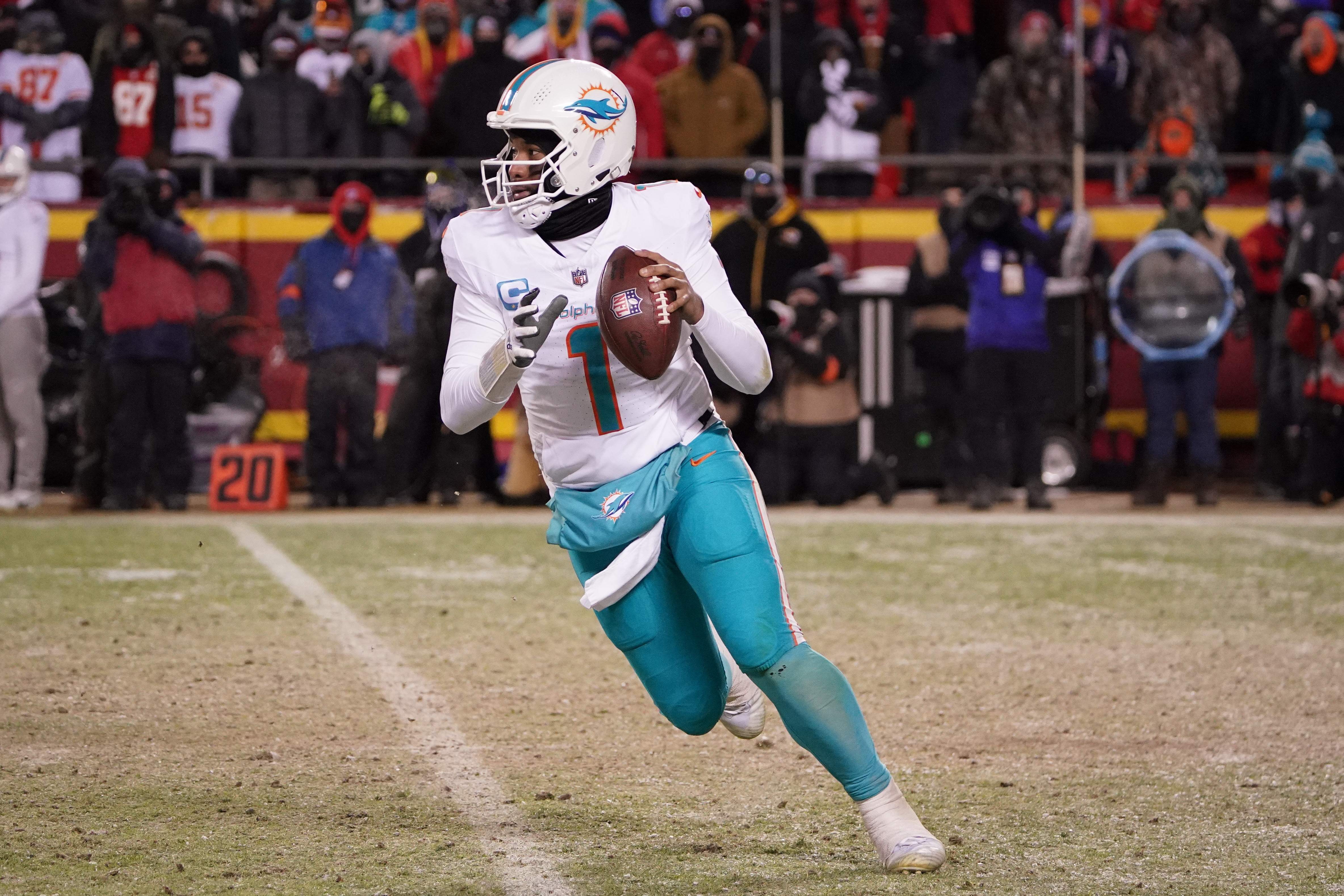Miami Dolphins quarterback Tua Tagovailoa overcame concerns over his long-term durability with a career-best season in 2023. However, with the Dolphins eliminated from the NFL playoffs in part because of Tagovailoa’s issues, there’s an ongoing debate about replacing him.
Miami’s options would be rather limited. It doesn’t have the assets to trade up for a top pick in the 2024 NFL Draft and there are no signs of an All-Pro quarterback demanding a trade this offseason. However, a few possibilities exist via free agency and in risk-reward trades.
- Tua Tagovailoa stats 2023: 101.1 QB rating, 69.3% completion rate, 4,624 passing yards, 29-14 TD-INT, 8.3 yards per attempt, 272 passing yards per game
Tagovailoa has played well in the regular season over the last two years and has stepped up as a leader of the Dolphins’ locker room. Of course, the goal is to win a Super Bowl and the quarterback’s limitations could force the front office to consider alternatives.
Related: Miami Dolphins draft picks 2024
Here are 3 quarterbacks who could replace Tagovailoa as the Dolphins’ starter in 2024.
Tua Tagovailoa replacements for the Miami Dolphins
Kirk Cousins, free agent
Considering the other team needs for Miami, the Dolphins’ best option if trying to replace Tagovailoa is to sign Kirk Cousins in free agency. While he carries more risk coming off a torn Achilles, he also wouldn’t cost any draft capital to acquire. Instead, the Dolphins could sign him and trade Tagovailoa.
- Tua Tagovailoa stats vs pressure: 57.5 QB rating (34th in NFL), 56.5% Adjusted Completion rate (39th), 5.5 yards per attempt (27th)
Related: Why Miami Dolphins have hit their ceiling with Tua Tagovailoa
- Kirk Cousins stats vs pressure: 104.4 QB rating, 71.1% Adjusted Completion rate, 7.4 yards per attempt
Some will argue that Cousin’s numbers in the playoffs – 93.7 QB rating, 1-3 record – would disqualify him as a replacement. However, upgrading over Tagovailoa is entirely about finding a quarterback who doesn’t put a ceiling on this offense. He’s great when operating within the basic structure of the play call by Mike McDaniel, but it’s chaos when Tagovailoa has to create on his own.
Cousins is just as accurate of a passer as Tagovailoa, while bringing better decision-making and the ability to more consistently make on-target throws to the outside. Just being able to incorporate that more frequently into Miami’s passing game would make a difference against great defenses.
Related: NFL execs suggest Miami Dolphins need to trade Tua Tagovailoa
Geno Smith, Seattle Seahawks
With the Seattle Seahawks moving on from Pete Carroll, Geno Smith may become available. The 33-year-old quarterback doesn’t necessarily fit into the team’s young core and Seattle could generate $22.5 million in cap savings by making a post-June 1 trade with Smith.
| PFF grade | Adj. Completion | TD-INT | QB Rating | |
| T. Tagovailoa vs pressure | 51.8 | 55% | 2-3 | 52.8 |
| T. Tagovailoa on play action | 92.7 | 81.4% | 8-2 | 109.1 |
| G. Smith vs pressure | 60..5 | 69.8% | 8-3 | 73.6 |
| G. Smith on play acton | 93.9 | 85.3% | 4-1 | 111.6 |
Related: NFL QB rankings
The benefit for Miami is that Smith’s contract wouldn’t be an anchor for them long-term. He carries a reasonable $31.2 million cap hit in 2024. If he underperforms or Miami wants to explore alternatives a year from now, it can cut Smith in 2025 for a $25 million cap savings. Another thing to keep in mind, Smith was even better when pressured in 2022 than he was this past season. Plus, he’d get to return home to Florida.
Justin Fields, Chicago Bears
The final quarterback option for the Miami Dolphins is the most unconventional. In replacing Tagovailoa with Justin Fields, McDaniel would essentially have to change his offense. The quick-passing approach resulted in Tagovailoa leading the NFL in the fastest average time to throw (2.34 seconds). Fields (3.40 seconds) delivers a stylistic change.
While that might seem like a bad thing on the surface, Miami’s system might need to be changed. In the first 10 games of the season, the Dolphins averaged 291 passing yards and 143 rushing yards per game. Defenses adjusted and in the final seven weeks, Miami’s offense averaged just 229.1 passing yards and 125.4 rushing yards per game. Opponents know what’s coming with Tagovailoa under center.
Fields would give Miami’s offense a fresh start, becoming a more run-heavy team that utilized designed quarterback runs, RPOs and the play-action. Making this offense more complex and forcing defenses to account for more variables could be better in the long run than what the Dolphins are doing now.

